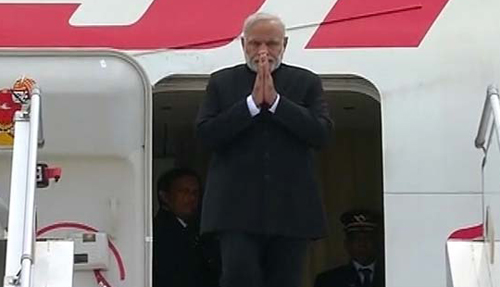Suva, Nov 18: Fiji's opposition party has decided to boycott the special parliament meeting planned for Prime Minister Narendra Modi tomorrow after the government withdrew its decision to allow it to move the vote of thanks.
Modi, the first Indian Prime Minister to visit the pacific nation in 33 years, is due to address Fiji's parliament tomorrow. But the opposition SODEPLA leader, Ro Teimumu Kepa said that Government has withdrawn it's decision for the opposition to move the vote of thanks in Parliament tomorrow.

In turn, the fifteen SODELPA members in Fiji's new Parliament said they will not attend the parliamentary sitting during which Modi will give his speech, Fijione reported.
"Government's decision ignores parliamentary best practice standards where the Prime Minister gives the welcome address and the opposition leader moves the vote of thanks," Kepa said.
The Opposition is also disappointed that the Chiefs have been excluded from the traditional welcome ceremony for Prime Minister Modi compared to what was accorded to Indira Gandhi during her visit in 1981.
Modi will be the first Indian Prime Minister to visit Fiji since Indira Gandhi travelled there in 1981.
On the other hand, Fijian Government has expressed "extreme disappointment" over SODELPA's decision to boycott the meeting planned for Modi.
"This visit is a national event, not a political one. It is an opportunity for our nation to engage the leader of the world's largest democracy and one of Fiji's most important international partners in discussions that are critical for Fiji's future," the government said in a statement.
The visit to Parliament is an opportunity for the elected representatives of all the Fijian people—not just government—to share in this visit, the statement said.
Obviously, the government has primary responsibility for the visit and the official discussions, but it has taken care to ensure that Modi experiences a visit with all the people of Fiji, it added.
"SODELPA's position is an insult to the people of Ba and all Fijians. The members of SODELPA have put their own political agenda ahead of the national interest. At this time, all Fijians should be united in putting our best foot forward," the statement said.
Government believes that visiting leaders should not be used to fight petty political battles. This is an important moment for Fiji, a time for Fijians to put their differences aside—even momentarily—in the interests of the nation, it added.
Unfortunately, SODELPA has passed up another opportunity to show that it can rise above petty politics and work for the national good. The burden is on SODELPA to show that it think beyond its own agenda, show true leadership, and focus on what is good for the nation, it said.





Comments
Add new comment